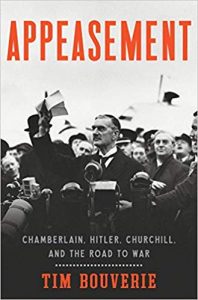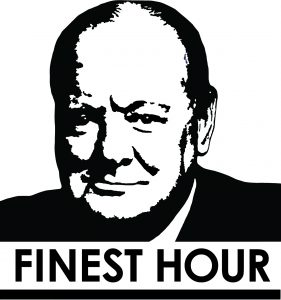Finest Hour 186
Churchill and the “German Question”
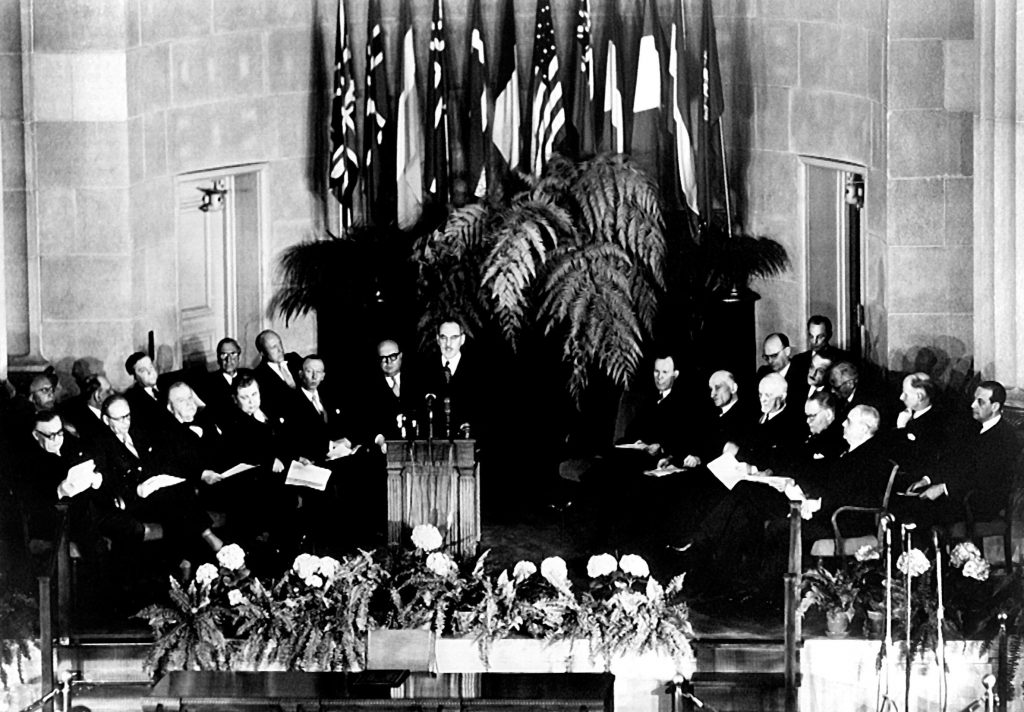
Secretary of the State Dean Acheson addressing the North Atlantic Treaty signing ceremony in Washington, D.C., April 1949
January 28, 2020
Finest Hour 186, Fourth Quarter 2019
Page 28
By Klaus Larres
Throughout his long political life Churchill frequently was confronted with the “German Question.” In fact, even prior to the First World War, dealing with Germany became a major preoccupation for him. From the 1930s to his retirement from politics in 1955, it was the German Question that dominated Churchill’s political life and turned him into one of the world’s most successful and most famous politicians.1
Churchill’s first serious encounter with the German Question came just before the cataclysm of 1914 when, as First Lord of the Admiralty, he had to deal with the German-British naval race. At that time he grew so worried about the escalating tension between the world’s foremost empire and the globe’s most aggressive rising power that the young politician reached out to Prime Minister Herbert Asquith and Foreign Minister Edward Grey with the suggestion that he should be given permission to approach formally the German naval minister, the formidable Admiral Alfred von Tirpitz, to convene a high-level meeting. Churchill wanted to overcome the naval race through personal negotiations.
On his own the First Lord had already sent an informal inquiry to Tirpitz, but Asquith and Grey hesitated and expressed their surprise and unease about this rather unusual proposal for de-escalating a major world crisis. Since Churchill never received a reply to his private letter to Tirpitz, his superiors wanted him to drop the matter. They asked him not to pursue any further the idea of high-level summitry to deal with the Anglo-German naval race. Perhaps a chance to resolve the crisis was thrown away. When war broke out in August 1914, it certainly was too late.
Changing Tides
In the 1930s and 1940s Churchill’s political fate became even more closely aligned with the German Question. It was his furious calls for British rearmament in the face of a rapidly rearming Germany and his denouncement of the appeasers in British politics around Prime Minister Neville Chamberlain that brought him renewed attention in Britain. During his so-called “wilderness years” between 1929 and 1939, he had held no formal office and was a largely sidelined backbench MP. His warnings about the rising threat of Nazi Germany, however, gradually brought him new respectability.
Many of Churchill’s countrymen deeply mistrusted him and, it seemed, with good reason. Churchill’s unsuccessful and highly controversial Gallipoli policy in 1915, his instrumental role in pushing through Irish Home Rule in 1922, his crossing of the floor from the Liberals back to the Conservatives in 1924, his support in the 1936 abdication crisis for the embattled and unpopular Edward VIII, and also his strong opposition to self-determination for Britain’s many colonies, including above all for India, had made him a pariah among many Britons throughout much of the 1920s and 1930s. This all changed when it became increasingly clear that Churchill’s warnings against what turned out to be Hitler’s aggressive and expansionist policies in Central and Eastern Europe proved to be prescient and utterly correct.
It was, therefore, Churchill’s opposition to Hitler that resuscitated his political career and brought him back into government. Robert Rhodes James, Churchill scholar and former Conservative MP, wrote that if Churchill had died in 1939 he would have been regarded only as a talented and moderately successful politician who, however, never managed to fulfill his early potential.2 Instead, of course, by the late 1930s the climax of his career was still ahead of him. Churchill was appointed First Lord of the Admiralty again on 3 September 1939, the day Britain declared war on Nazi Germany. He then became Prime Minister upon Chamberlain’s resignation in May 1940. Churchill’s successful fight against the Nazis, in cooperation with the Soviet Union and the US, was what turned him into a global statesman. By 1945 he had become the world’s most famous and well-known politician.
The Iron Curtain
Churchill took his loss of power in the 1945 general election very badly. Despite his steep personal popularity ratings, he resented that the unpopularity of his party had brought his wartime deputy, Labour leader Clement Attlee, into Downing Street as Prime Minister. Churchill remained bitter for a prolonged period of time. He suffered from depression and comforted himself with painting in the south of France and laying bricks at his Chartwell estate in the south of England.
It was only in early 1946, when US President Truman asked him to deliver a speech at Westminster College in Fulton, Missouri, that his spirits revived. This speech— soon called the “Iron Curtain” speech though officially and more appropriately entitled “The Sinews of Peace”— enabled him once again to impress a global audience with his thinking and strategic reasoning. It gave him the opportunity to warn against the apparently uninhibited expansionist drive of Stalin’s Soviet Union.3
Yet, in this speech he not only warned about the Soviet Union’s aggressive intentions, he also explained that East-West tension could only be overcome by constructive engagement and the convening of talks with Moscow. This part of the speech, however, was largely ignored by the media and other contemporary observers. Instead his talk in Fulton caused a great deal of upset. Still remembering the anti-Hitler cooperation between Stalin and FDR, the US public condemned Churchill’s speech as too aggressive. Surprised by this unexpected reaction, President Truman weakly distanced himself from Churchill’s sentiments. It took more than six months for the American public to come round to the British statesman’s point of view. Only in the fall of 1946 did Americans begin to regard Stalin’s policies in Eastern Europe and elsewhere as increasingly suspicious.
Two Themes
Throughout the years from 1945 to 1951, when he was leader of His Majesty’s opposition, Churchill neglected his role in domestic British politics. Instead he wished to be present on the global scene and contribute to the international discussions of the day. In order to do so he had to identify a theme, or a number of themes, that would make a significant contribution to the public debate and keep him in the eye of the British and global public. Churchill found two themes with which he became strongly identified during his time in opposition.
The first theme was the idea of a united Europe and the beginning of what came to be called the European integration process. Churchill strongly supported such an unfolding policy. For instance, in a 1948 conference at The Hague, he was instrumental in initiating the creation of the Council of Europe. Churchill, however, always believed that Britain could not be part of a united Europe. After all, his own country had won the Second World War and therefore clearly was on the same great power level as the US and the USSR. He could not see Britain as a mere European country comparable to the conquered and destroyed nations of the continent.
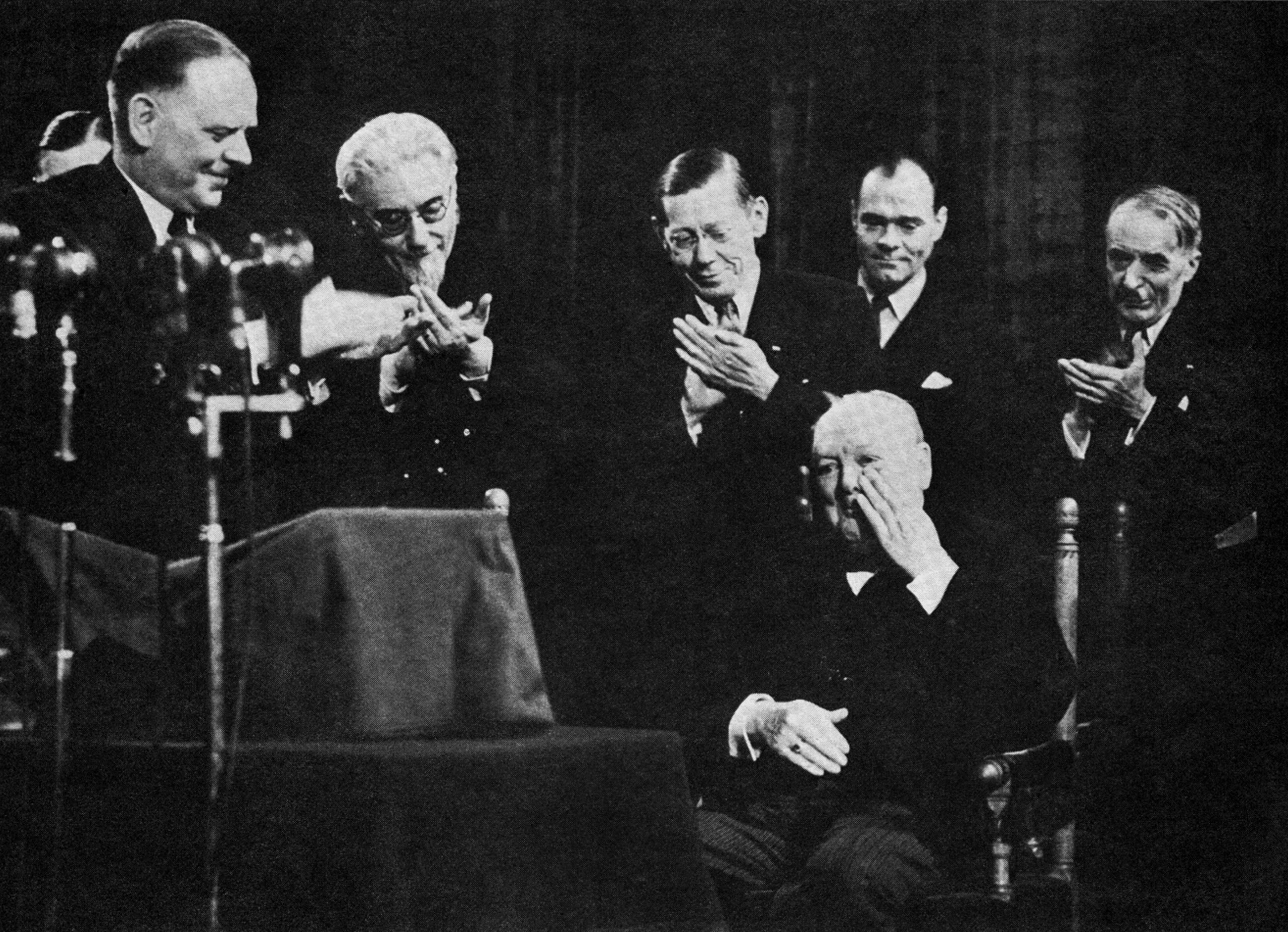
As soon as Churchill became Prime Minister for the second time, however, following a narrow general election victory in October 1951, his enthusiasm for building a united Europe disappeared almost overnight. His new government did not re-visit the Attlee administration’s rejection of British participation in the European Coal and Steel Community (the Schuman Plan), which became the forerunner of the European Economic Community of 1958. This was a hugely important decision, which set the path for the UK’s skeptical, if not hostile European integration policy for the next few decades. Yet once back in Downing Street, Churchill did not even ask his ministerial colleagues to discuss the matter in Cabinet.
Churchill’s second theme, which he pursued during his time in opposition and indeed throughout his peacetime government from 1951 to 1955, was the attempt to deal with the Soviet Union constructively and improve relations with Stalin and his successors. In view, though, of the nuclear threat and the Soviet Union’s wartime sacrifices when fighting Hitler’s Germany, a policy of careful engagement and cooperation needed to be paired with firmness. This could only be done from a position of strength. Eventually, in an election speech in Edinburgh in 1950, Churchill made it unambiguously clear what he had in mind. Controversially he called for a “parley at the summit” of the leaders of the US, the USSR, and of course Britain to continue and complete the Potsdam conference. In this way he hoped to end the Cold War and overcome the division of Europe into East and West.
Summit Searching
During his years in opposition Churchill also paid great attention to the developments in Germany. But as he could do very little to influence Britain’s occupation policy in the defeated country and also largely agreed with the Attlee government’s German policy, Churchill’s main focus remained on the relationship with Moscow and the creation of a united (western) European continent. He frequently called for a rapprochement between France and Germany. In particular he admonished the global community to provide the Germans with a way back into the civilized community of nations by allowing them to participate in the rebuilding of Europe. Isolating and marginalizing them, as had happened after the First World War, was emotionally understandable but fundamentally wrong and misguided.
When Churchill returned to Downing Street in October 1951, he immediately wanted to embark on realizing his summit diplomacy with the Soviet Union to overcome the Cold War. But at the time the Cold War was growing ever more tense. The 1949 creation of West and East Germany, the founding of NATO in April of the same year, and not least the outbreak of the Korean War in mid-1950 as well as Stalin’s terrible show trials in Moscow ensured that East-West cooperation was hardly possible. The ultimately ill-advised attempt to create a European Defense Community (EDC)—much resented and viewed highly suspiciously by Stalin—did not help the situation either.
Thus neither Stalin nor President Truman believed that East-West summit diplomacy was possible or advisable. Churchill was deeply frustrated and did not hesitate to voice his anger repeatedly when talking privately to his foreign policy advisers. But he could do little about this situation. During his visit to the Truman White House in early 1952, the Prime Minister was unable to convince the President to join him in an initiative to overcome the Cold War by means of opening talks with the dictator in the Kremlin.
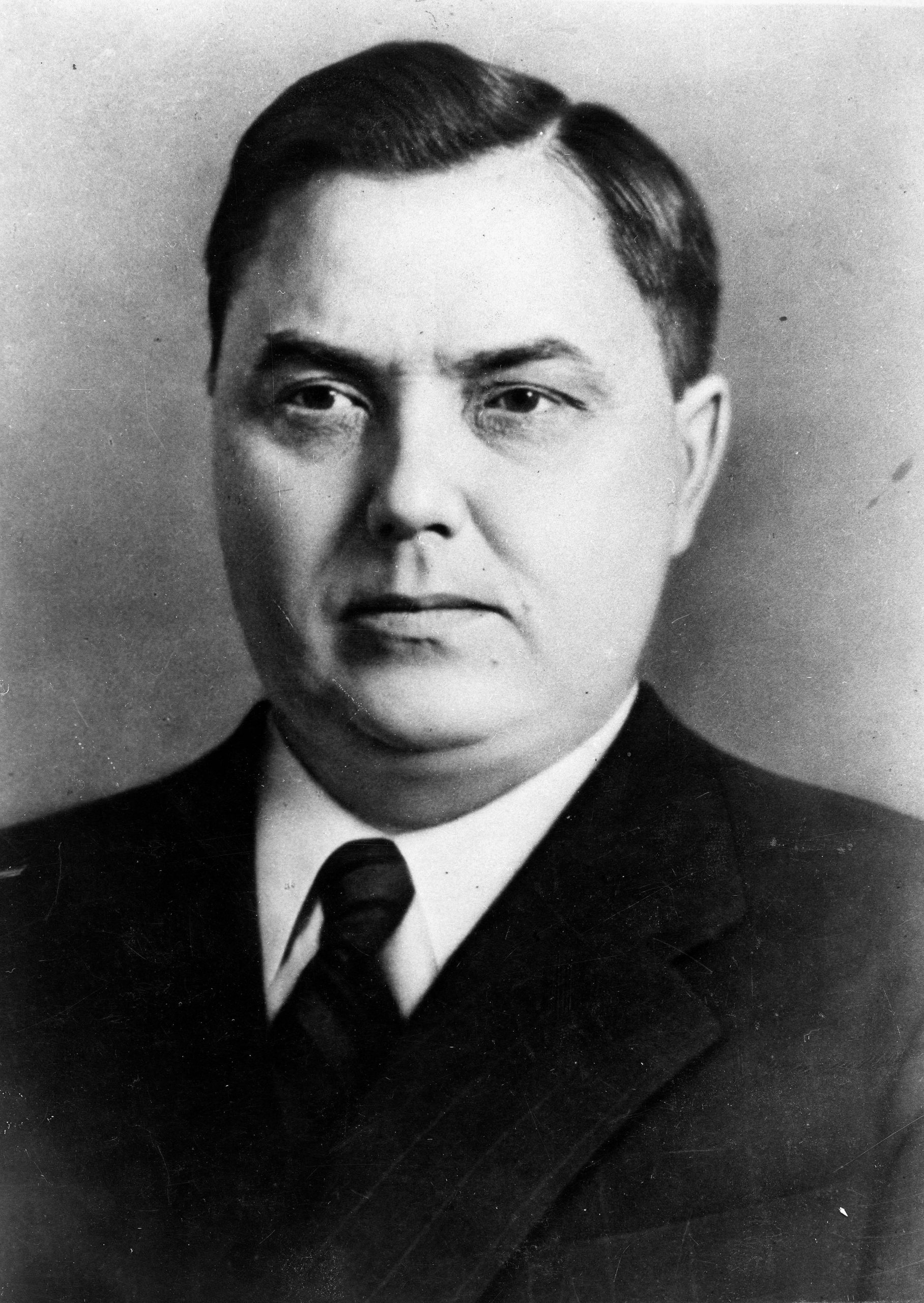
Churchill’s opportunity appeared to arrive with Stalin’s death on 5 March 1953. Initially, the dictator was succeeded by a committee. In the West, Georgy Malenkov was generally (though quite mistakenly) seen as primus inter pares and the real successor to Stalin. The new collective leadership feared turmoil inside the Soviet Union after Stalin’s death and also believed that the US might use the opportunity to attack the USSR and bring down the Soviet regime. To counter both possibilities, Moscow emphasized the production of consumer goods and became, at least superficially, more friendly toward the West. Not least, the new Soviet leaders quickly decided to agree to terminate the war in Korea, release a large number of imprisoned dissidents, and embark on other measures that would relax East-West tension.4
While many western politicians, especially in the White House, viewed this new policy cynically and most skeptically, Churchill was more optimistic. He took the new leaders’ pronouncements at face value and attempted to convince the administration in Washington to join him in a summit meeting with the new Soviet order. Recently inaugurated US President Dwight D. Eisenhower, however, was adamant that nothing substantial had changed in Moscow and that it was too early to contemplate a summit conference.
The German Gambit
For the next few months Churchill continued to attempt to persuade Eisenhower to support an overture towards Moscow. What the British Prime Minister had in mind were not just mere talks with Malenkov. He wanted to table a suggestion for ending the Cold War by overcoming the German question. In top-secret memoranda and conversations with his advisers, Churchill indicated that he was prepared to give up the process of integrating West Germany with the western powers if the Soviets relinquished their control over East Germany. He would then agree to German unification on a neutral basis and ipso facto a united Germany not firmly anchored to the western world. In this way Churchill hoped to overcome the division of Europe and end the escalating armaments race between East and West.
Although Britain was about to take the decision to manufacture its own highly expensive Hydrogen Bomb, the slowly recuperating British economy could hardly keep up with the Cold War arms race. Additionally, instead of formal diplomatic negotiations, Churchill believed that informal, personal talks between Malenkov, Eisenhower, and himself without any advisers present would succeed in achieving a breakthrough in relations between East and West. He was convinced that his personal charisma could impress the force of his ideas on the other two world leaders and carry the day.5
Churchill’s advisers, including his heir apparent—the Foreign Secretary Sir Anthony Eden—were outraged by both the Prime Minister’s idea of how to conduct negotiations with the Soviet Union and the substance of what he intended to propose. Churchill, after all, wished to sacrifice Germany’s integration with the West for achieving a deal with the Russians. His ideas resembled those Stalin had put forward in his 1952 Stalin Note, which had been comprehensively rejected by all major western powers, including Britain and even the West Germans themselves.
Hopes and Realities
What were Churchill’s motives? The aging Prime Minister genuinely believed that the German Question had to be overcome as quickly as possible since the Germans would not tolerate the division of their country for long and might resort to military means to bring about reunification. Churchill was also seriously concerned that the escalating arms race would lead to a terrible nuclear war between East and West. He had little confidence in the US not using the atomic bomb against the Soviet Union as long as Washington still had a near-monopoly on nuclear weapons.
Churchill also knew that Britain could no longer keep up with the superpowers militarily; the arms race was becoming much too expensive for London. If his country wanted to remain a great power, a solution had to be found for lessening British military expenditure and de-escalating the East-West arms race. Lastly, Churchill was fully aware that there was enormous pressure on him to resign as prime minister in view of his increasing health problems and his age. Initiating a summit conference with Moscow, he reasoned, and possible successor conferences would make him indispensable and keep him in office for a prolonged period of time.
Although Churchill’s ideas for overcoming the Cold War at an early stage were well-meant and not without imaginative strategic foresight, they were also quite unrealistic. Not only were US leaders unwilling to join him, the new Soviet leadership was much less benign and willing to cooperate than Churchill believed.
When the East German uprising occurred in midJune 1953 and when Churchill suffered a debilitating and almost fatal stroke in July, the rug was pulled from under his initiative to terminate the Cold War. How could anyone negotiate with a regime in Moscow that had just sent tanks into East Berlin to bring a violent end to an uprising against Soviet predominance in East Germany? Sending in tanks was hardly the gesture of a government willing to negotiate and cooperate with the western world.
Churchill’s stroke meant moreover that he was tied to his sick bed for the best part of the summer and early fall 1953 (until September). He was therefore unable to work on his initiative and persuade his Cabinet colleagues and the US to go along with it. Instead, his advisers, including Foreign Secretary Eden, used the opportunity to undermine Churchill’s ideas of how to deal with the Soviet Union. Their opposition only strengthened Eisenhower’s resolve not to give in to Churchill’s push for a summit conference with Moscow to end the Cold War and resolve the German Question.
Never Give In
By October 1953, however, Churchill had sufficiently recovered that—propped up by pills and injections—he managed successfully to give the party leader’s speech at the Conservative Conference in Margate. Pressure on him to retire decreased. Churchill attempted again to push for a summit conference with the Soviet Union. But Washington remained adamant that the US would not participate. During a meeting of western heads of government at Bermuda in December 1953 (Churchill’s last international conference), Eisenhower and Secretary of State John Foster Dulles made this clear to the British Prime Minister in rather unambiguous, if not rude terms. Full of resentment, anger, and frustration, Churchill had to accept that there was little he could do in the face of American opposition to his plans.
In the summer of 1954 Churchill embarked on a state visit to America. Much to Eisenhower’s frustration, he used the opportunity to attempt persuading the President once again of his idea of a summit with the USSR. Eisenhower rejected Churchill’s pleading politely but firmly. Churchill realized that time was running out. His health was getting worse, and there was increasing pressure on him from his Cabinet colleagues as well as his wife to retire from politics. He was almost eighty years old. But Churchill wanted to make a final attempt to go down in history not just as a successful wartime premier but also as a peacemaker—the one who had been able to overcome the Cold War and the division of Europe.
Sailing back from New York to England on board the Queen Elizabeth, Churchill sent a telegram to Soviet Foreign Minister Vyacheslav Molotov asking to be invited to Moscow. He said he wished to go on a “solitary pilgrimage” to the USSR to clear up the many misunderstandings between Moscow and the western world. When his Cabinet colleagues found out about his initiative, they were outraged. Several of them threatened to resign if the aging Prime Minister did travel to Moscow to negotiate with the devious men in the Kremlin. President Eisenhower in Washington was not amused either. In fact he was furious. A serious crisis in Anglo-American relations as well as a deep Cabinet crisis in London was brewing.
But Churchill was lucky. Molotov never replied to the telegram, and the Prime Minister realized himself that he could hardly go to Moscow without an invitation. When a few weeks later Moscow suggested an all-European security conference without the participation of the US, it was clear that the new men in the Kremlin did not seem to be interested in genuine negotiations.
In February 1955 Malenkov resigned his position, and Churchill believed he had lost his compromise-ready counterpart. He increasingly realized that his bid to make peace between Moscow and the West and achieve the reunification of both Europe and Germany was unlikely to succeed. Churchill announced that he would retire as Prime Minister in April 1955—more than half a century since he had first been elected a member of Parliament in October 1900.
Dr. Klaus W. Larres is the Richard M. Krasno Distinguished Professor of History and International Affairs at the University of North Carolina at Chapel Hill. His website is www.klauslarres.org
Endnotes
1. The following essay is largely based on the much more detailed account in my book Churchill’s Cold War: The Politics of Personal Diplomacy (New Haven: Yale University Press, 2002).
2. Robert Rhodes James, Churchill: A Study in Failure, 1900– 1939 (London: Penguin, 1981).
3. For details, see my article “Churchill’s iron curtain’ speech in context: the attempt to achieve a ‘good understanding on all points’ with Stalin’s Soviet Union,” International History Review, Vol. 40/1 (2018), pp. 80–107.
4. See Joshua Rubenstein, The Last Days of Stalin (New Haven: Yale University Press, 2016).
5. For further details, see Larres, Churchill’s Cold War, chapter 11 (“Churchill’s Vision”).
Subscribe
WANT MORE?
Get the Churchill Bulletin delivered to your inbox once a month.

